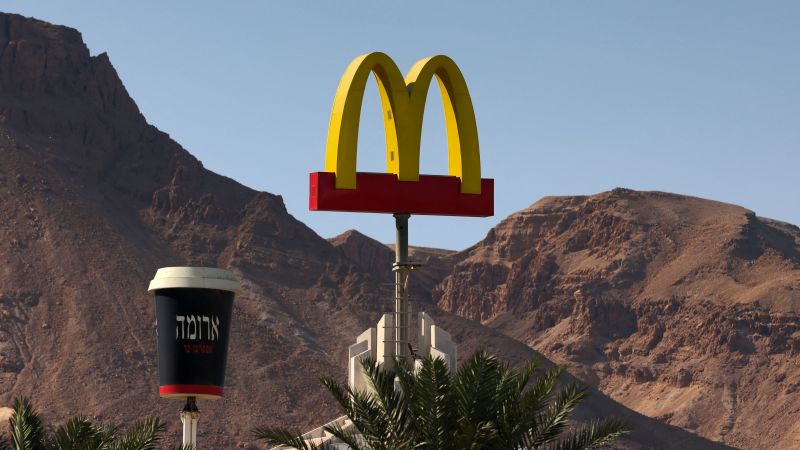McDonald’s Corporation has boldly decided to purchase all its franchises in Israel, a strategic move in light of the turmoil in the Middle East. The decision represents a significant shift in McDonald’s expansion strategy and highlights the opportunities and challenges of the unstable geopolitical environment.
McDonald’s Expansion strategy:
Franchise Acquisition:
According to Edutechbuddy, McDonald’s has a global presence, and its franchising system has relied upon local franchisees in many countries to run its restaurants. The recent purchase of the Israeli franchises signals a change in this strategy. McDonald’s decided to take direct control of its regional operations rather than relying solely on franchisees.
The Impact of Middle East Turmoil on
Purchasing back franchises in the Middle East is timely due to increased tensions and instabilities. Multinational corporations in the Middle East have faced challenges due to political unrest, economic uncertainty, and security threats. By taking over its Israeli restaurant, McDonald’s hopes to reduce the risk of external factors that are beyond its control.
McDonald’s move:
Consolidation of the Market:
McDonald’s’ decision to consolidate the market is one of its primary motives. The company’s ability to streamline operations, increase efficiency, and maintain uniform standards throughout its outlets is enhanced by owning its entire restaurant network in Israel. McDonald’s can strengthen its position in Israel by implementing this consolidation strategy.
Brand control:
McDonald’s also wants to control its image and reputation. Directly managing its restaurants allows the company to ensure that its products and services meet quality standards and adhere to brand values. Maintaining this level of control is important in Israel’s diverse market, which has a wide range of consumer expectations and preferences.
Stability of the Economy:
Given the Middle East economic turmoil, McDonald’s can maintain greater flexibility and financial stability. By eliminating its dependence on franchisees, the company manages fluctuations in local currency and the economy by eliminating strategic decisions that reflect its long-term commitment to business goals and shareholder value.
McDonald’s Challenges:
Political Unrest
McDonald’s Middle East faces several challenges, including the security and political risks prevalent there. Conflicts and tensions in the Middle East can affect operations and negatively impact consumer confidence and sales. McDonald’s has taken on greater responsibility by directly owning the Israeli restaurants. This will allow them to manage these risks better and ensure that their employees and customers are safe.
Brand image:
McDonald’s must maintain a positive image in all markets. The company has to tread lightly in Israel, where political and cultural affiliations and sensitivities are nuanced. This is important for avoiding controversies. By owning franchises, McDonald’s can control marketing messages and its brand more. This helps protect its reputation with consumers and builds trust.
Consumer Behaviour:
McDonald’s in Israel must adapt to the local culture and consumer behavior. The brand is well-known and popular worldwide. However, its marketing and product offerings must be tailored to Israeli preferences and tastes. By owning its restaurants, McDonald’s can gain firsthand insight into the consumer’s behavior. It will then be able to adjust its pricing and promotional strategies.
Strategies for Mitigating Risks:
Local Market Adaptation:
One of McDonald’s most vital assets is its ability to adjust to local market needs while maintaining its global identity. The company’s international expertise and experience can be used to create menu items tailored to the local tastes in Israel. McDonald’s can appeal to diverse customers by offering familiar and culturally relevant options.
Crisis management:
McDonald’s must have an effective crisis management strategy to meet the challenges of the Middle East. External shocks can lessen business if the company proactively addresses potential vulnerabilities and risks. Robust security measures and contingency plans may also be necessary, as well as maintaining open communication with all stakeholders.
Implications of the Fast Food Industry:
The Competitive Landscape:
McDonald’s purchase of Israeli franchises will likely ripple effect on this region’s fast food industry. McDonald’s increasing market presence may force competitors to reconsider their expansion strategies or operational models. It could also increase competition and innovation as brands compete for consumer loyalty and market share.
Global Market Trends:
The global trends shaping the fast food industry can be seen in its decision to purchase back franchises from Israel. Global corporations seek greater control of their business operations to minimize risks and maximize growth. Globalization, technology advancements, and consumer preference changes drive vertical integration.
Conclusion:
McDonald’s acquisition of all its Israeli franchises despite the turmoil in the Middle East shows the company’s commitment to brand integrity and its growth strategy. By taking ownership directly, McDonald’s hopes to maintain its control and consolidate its position in Israel. McDonald’s is now better positioned to continue its success in an uncertain and dynamic environment.
FAQs:
- What was McDonald’s decision to purchase its Israeli franchises? McDonald’s acquired Israeli franchises to maintain its brand, mitigate risk, and consolidate its presence amid Middle East unrest.
- What will be the impact of this change on McDonald’s Middle East operations? This move should streamline operations, increase efficiency, and improve McDonald’s position as a competitive company in the Middle East.
- How might McDonald’s be affected by political turmoil?

